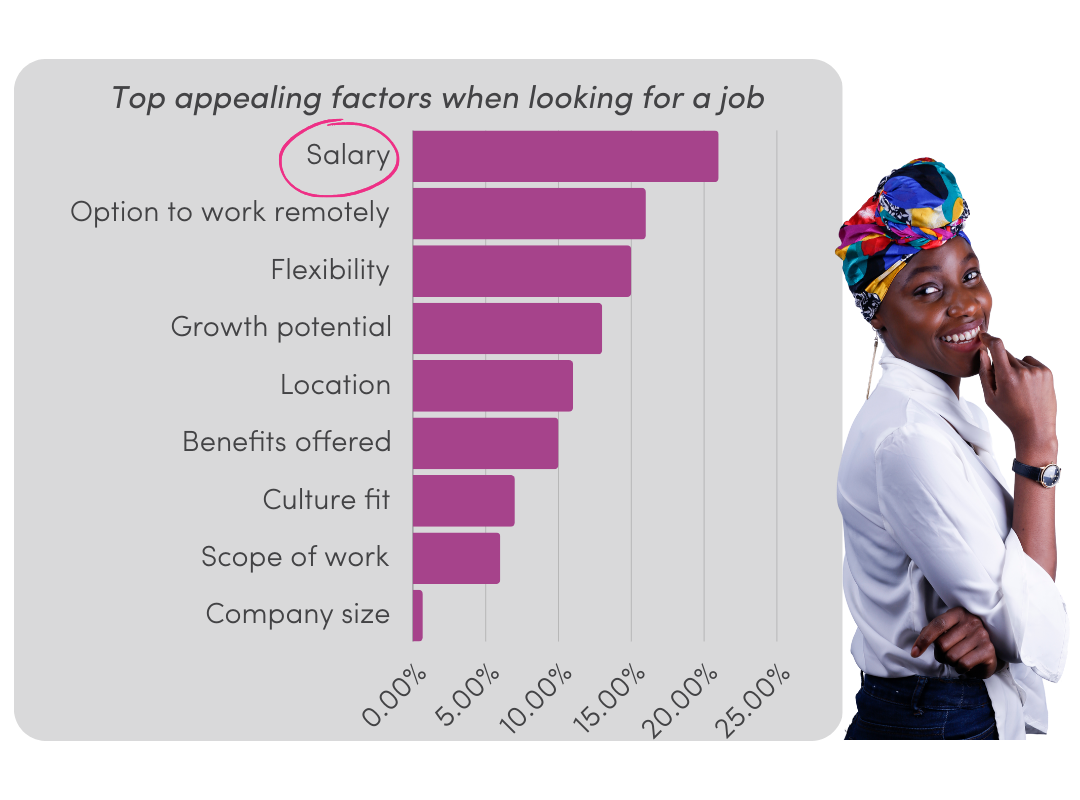
Attracting and retaining top female talent has become a crucial focus for organisations aiming for sustainable growth, diversity, and long-term innovation. As highlighted in the RecruitMyMom Working Women Report 2024, women's desire for financial compensation and flexibility is paramount when navigating their careers. This article explores how aligning compensation with industry standards and offering flexible work arrangements enhance attraction and retention strategies for female employees.
The Importance of Financial Compensation
Aligning Salaries with Industry Standards
Financial compensation is a fundamental factor influencing job satisfaction and employee retention. According to the 2024 RecruitMyMom Working Women Report, 21% of women in the SA workforce actively sought new employment opportunities, with competitive salary offerings being a significant motivating factor.

By conducting regular industry benchmark salary reviews, employers ensure that their talented female staff members are compensated fairly. A commitment to fair pay and proven company benefits reduces the likelihood of them seeking other job opportunities. Investing in their well-deserved remuneration reinforces their organisational value, fostering a motivated and loyal workforce that contributes to company growth and success.
The Growing Importance of Financial Reward
Financial security has become increasingly important for employees in the workforce, especially after the pandemic. The economic and financial landscape has changed, and many women balance multiple responsibilities—such as caregiving and career advancement—making competitive compensation essential for their overall sense of well-being. By ensuring fair pay, companies attract reliable talent and create an environment where employees feel valued and secure.
The Need for Flexibility in Work Arrangements: Place or Hours
Integrating Work and Life Holistically
As gender equality has improved, demands on personal and professional fronts increased, and flexibility in work arrangements has emerged as a critical factor in retaining female talent.
The Working Women in SA Report 2024 reveals that as women progress in seniority and responsibility, their desire for flexible working methods increases significantly. In fact, 80% of executive women expressed a preference for a reduced work week or part-time hours, highlighting the need for organisations to consider these changing expectations.
Over the past decade, workplace flexibility has grown substantially, with a major boost due to the pandemic. Many companies expanded hybrid and remote work options, and today, 80% of employees say that flexibility has improved. Employees frequently cite increased productivity and reduced burnout as top benefits of flexible work arrangements. Flexibility is particularly valuable to women, who often find that remote work allows for more focused and efficient work time.
Flexibility enables women to integrate work and life holistically, reducing stress and enhancing overall job satisfaction. By offering options such as hybrid working models, reduced hours, or fully remote positions, employers empower their female employees to manage their time effectively while maintaining productivity.
Reducing Burnout and Increasing Well-Being
Flexibility supports work-life balance and plays a crucial role in reducing burnout—a significant concern among working women. Studies have shown that flexible work arrangements increase employee satisfaction and well-being. When organisations prioritise flexibility, they send a powerful message that they trust their employees and care about their well-being.
Flexibility is a Strategic Investment in Retention
Integrating flexible work policies (hours or place of work flexibility) is a strategic investment in retaining female talent. Companies that foster flexible work cultures are perceived as forward-thinking and attract a broader talent pool, including GenZ's and experienced women seeking to re-enter the workforce after a career break. By enabling senior female managers to manage their time effectively, businesses will unlock their full potential while ensuring they remain productive and committed.
How to Balance Flexibility with Productivity
While providing flexibility is essential for employee satisfaction, it is important to acknowledge productivity concerns. Some employers may worry that flexible arrangements could lead to decreased output. However, organisations will ensure that business objectives are met by implementing clear performance metrics and focusing on business impact results rather than hours worked. Establishing key performance indicators (KPIs) allows companies to monitor output effectively while fostering an environment where employees feel trusted and empowered to manage their schedules.
The desire for both financial compensation and flexibility is increasingly shaping the landscape of employee retention strategies, particularly for top female talent. By conducting regular salary reviews to align compensation with industry standards and embracing flexible work arrangements, organisations create a strong HR retention and attraction strategy for long-term growth.
As highlighted by the RecruitMyMom Working Women Report 2024, addressing these needs is essential for creating an inclusive environment where women can thrive personally and professionally. By prioritising fair pay and flexibility while maintaining productivity through effective performance measures, companies will build a robust pipeline of skilled women ready to take on leadership roles, driving diversity, innovation and growth in an increasingly competitive market.
If you need assistance in finding out what a market-related salary is for your talent, be in touch with us and we will assist you.


